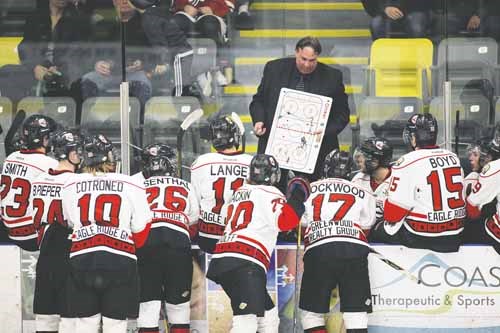Al Michaels' famous call "Do you believe in miracles?" may be tied to the 1980 U.S. Olympic hockey team, but it could equally be ascribed to the rise of the Coquitlam Express in the 2013-14 B.C. Hockey League playoffs.
A club that struggled at .500 in the regular season (27-26-2-3) despite glimpses of better-than-average skills, suddenly revealed a sleek, powerful engine that tossed aside four higher-seeded rivals en route to a Fred Page Cup crown.
Now they hope to repeat the magical run against four challengers at the Western Canada Cup in Dauphin, Man.
Not often does a team seeded ninth in the playoffs change course in such dramatic fashion - but then Coquitlam appeared built for the long haul.
"Your goal every year is to win a championship but only one team gets to do it," said head coach Barry Wolff. "We were a little behind the eight-ball when I came in (he was hired in late April) but I had a lot of help, we had a good core to work with and then I called in all my favours to my contacts and they helped me find players who wanted to come (to the BCHL). I depended a lot on friends and contacts who sent some big players our way."
The list of players who his contacts steered his way, coming from such hockey stops as Roseville, Minn., Philadelphia, Penn. and Montvale, NJ via Vermont, virtually all paid off big.
"I owe a lot of bar tabs at the end of the season, no doubt," he chuckled.
While he had a veteran defence to build around, one of his biggest deals came days before the start of the season when Wolff shipped three players to the Brooks Bandits for netminder Gordie Defiel. The Stillwater, Minn. native, who backstopped the Minnesota Wilderness to a Royal Bank Cup semifinal game last year, filled the most gaping need at nearly the 11th hour.
That acquisition, coupled with the team immediately falling in line behind 20-year-old captain Ryan Rosenthal - himself a newcomer to the league after sitting in the press box as a freshman at the University of Vermont in 2012-13 - pulled the pieces together.
Offensively, the team forged the highest scoring lineup around the trio of Rosenthal, Philadelphia's Corey Mackin and hometown boy Adam Rockwood.
But the team's middling results forced Wolff to tinker with the defence on the fly, restocking around returnees Marc Biega, Cam Marks and Zach Hodder. He added JD Cotroneo and Mark Whiteley at the Jan. 10 deadline, but the team maintained its .500 ways.
When the playoffs began, few would bet on the darkhorse Express.
Down 1-0 in the series against Prince George, the underdogs rebelled and stole one in the northern town, spurred on by Defiel's stellar netminding. From that moment, the club seemed to believe. They finished the Spruce Kings in six, then took the opening two games in Langley against the league's top team.
Suddenly, the train was on track, and in a big way.
Like a high-speed locomotive, Coquitlam rarely slowed down and flashed impressive resilience.
In the league's semifinal round-robin, after getting spanked 6-1 by Vernon, the Express fashioned two clutch come-from-behind wins over No. 2-ranked Victoria to advance to the final.
They continued on that theme, winning all four games against Vernon with a rally - including spotting the Vipers a three-goal lead in the opener.
With an ineffective powerplay, which produced just seven goals on 69 chances during the playoffs, it tallied six shorthanded goals, including the cup-clincher in Game 4 against Vernon, again by Rockwood.
Now the trick is to repeat that feat against a whole new cast of competition.
The Express seem unfazed by standings, rankings and prognosticators, which is a good thing. Unlike Yorkton, Dauphin and Spruce Grove - who was ranked No. 1 in the national junior A polls for six weeks - Coquitlam's name has remained under the radar all season, much like the Winnipeg Blues.
But they are in the game, beginning April 26 in Dauphin. And they are proof why believing in miracles is never a bad thing.




